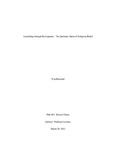| dc.rights.license | In Copyright | en_US |
| dc.creator | Boerckel, Wyn Scott | |
| dc.date.accessioned | 2013-04-10T13:04:06Z | |
| dc.date.available | 2013-04-10T13:04:06Z | |
| dc.date.created | 2013 | |
| dc.identifier | WLURG38_Boerckel_PHIL_2013 | |
| dc.identifier.uri | http://hdl.handle.net/11021/23841 | |
| dc.description | Thesis; [FULL-TEXT FREELY AVAILABLE ONLINE] | en_US |
| dc.description | Wyn Scott Boerckel is a member of the Class of 2013 of Washington and Lee University. | en_US |
| dc.description.abstract | Critical philosophy has severely restricted the role of philosophy of religion. A hallmark of the critical approach is an acceptance of Locke's epistemological ethics: belief ought not to go beyond what explicit data or premises entail. If religion affirms a reality that transcends the scientifically observable and explicitly describable, critical philosophy rules such claims from the beginning. The evidential requirements have led to two opposite responses from religious thinkers: fideism, where the claims of science or reason are seen as having little or no bearing on religious belief, and what Avery Dulles called "rational counter-critical apologetics," where thinkers try to defend religious claims with public and explicit evidence more or less on critical philosophy's terms. The project of this paper is to offer a third way to understanding religious claims by showing how the truth of Michael Polanyi's dictum, "We know more than we can say," shows the mistaken limitations of critical approach and opens a philosophically acceptable approach to knowing God. Specifically, I will show that critical philosophy's dismissal of certain religious claims hangs on false assumptions and that Michael Polanyi's theory of personal knowledge not only helps to dispel these mistakes, but also offers a fruitful point of departure from which to understand religious knowledge. Then, modifying William Alston's defense of the epistemic similarity between sense perception and mystical perception so that his argument fits within the post-critical understanding of the tacit nature of all knowledge, I will argue that mystical perception can provide a basis for religious knowledge. [Taken from the initial paragraphs] | en_US |
| dc.description.statementofresponsibility | Wyn Boerckel | |
| dc.format.extent | 50 pages | en_US |
| dc.language.iso | en_US | en_US |
| dc.rights | This material is made available for use in research, teaching, and private study, pursuant to U.S. Copyright law. The user assumes full responsibility for any use of the materials, including but not limited to, infringement of copyright and publication rights of reproduced materials. Any materials used should be fully credited with the source. | en_US |
| dc.rights.uri | http://rightsstatements.org/vocab/InC/1.0/ | en_US |
| dc.subject.other | Washington and Lee University -- Honors in Philosophy | en_US |
| dc.title | Knowledge Through Participation: The Epistemic Status of Religious Belief (thesis) | en_US |
| dc.type | Text | en_US |
| dcterms.isPartOf | RG38 - Student Papers | |
| dc.rights.holder | Boerckel, Wyn Scott | |
| dc.subject.fast | Mysticism | en_US |
| dc.subject.fast | Perception | en_US |
| dc.subject.fast | Religion -- Philosophy | en_US |
| dc.subject.fast | Senses and sensation -- Religious aspects | en_US |
| dc.subject.fast | Knowledge, Theory of (Religion) | en_US |
| local.department | Philosophy | en_US |
| local.scholarshiptype | Honors Thesis | en_US |
